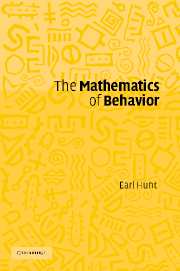Book contents
- Frontmatter
- Contents
- Preface
- 1 INTRODUCTION
- 2 APPLYING PROBABILITY THEORY TO PROBLEMS IN SOCIOLOGY AND PSYCHOLOGY
- 3 FROM PHYSICS TO PERCEPTION
- 4 WHEN SYSTEMS EVOLVE OVER TIME
- 5 NON-LINEAR AND CHAOTIC SYSTEMS
- 6 DEFINING RATIONALITY
- 7 HOW TO EVALUATE EVIDENCE
- 8 MULTIDIMENSIONAL SCALING
- 9 THE MATHEMATICAL MODELS BEHIND PSYCHOLOGICAL TESTING
- 10 HOW TO KNOW YOU ASKED A GOOD QUESTION
- 11 THE CONSTRUCTION OF COMPLEXITY
- 12 CONNECTIONISM
- 13 L'ENVOI
- References
- Index of Names
- Index of Subjects
7 - HOW TO EVALUATE EVIDENCE
Published online by Cambridge University Press: 04 May 2010
- Frontmatter
- Contents
- Preface
- 1 INTRODUCTION
- 2 APPLYING PROBABILITY THEORY TO PROBLEMS IN SOCIOLOGY AND PSYCHOLOGY
- 3 FROM PHYSICS TO PERCEPTION
- 4 WHEN SYSTEMS EVOLVE OVER TIME
- 5 NON-LINEAR AND CHAOTIC SYSTEMS
- 6 DEFINING RATIONALITY
- 7 HOW TO EVALUATE EVIDENCE
- 8 MULTIDIMENSIONAL SCALING
- 9 THE MATHEMATICAL MODELS BEHIND PSYCHOLOGICAL TESTING
- 10 HOW TO KNOW YOU ASKED A GOOD QUESTION
- 11 THE CONSTRUCTION OF COMPLEXITY
- 12 CONNECTIONISM
- 13 L'ENVOI
- References
- Index of Names
- Index of Subjects
Summary
THE LEGACY OF REVEREND BAYES
Is it going to snow today? The radio says it is snowing to the north, but where I live the weather generally comes from the southwest. The sky is gray, but the temperature is a bit above freezing. There is no wind, but the air is heavy with moisture. Evidence is accumulating! But what does it mean?
In Chapter 6, we looked at situations in which the rewards for an action could only be known up to a probability distribution. In that chapter the probabilities were assumed to be known. Here we look at how they might be established. This is the process of evidence evaluation. It is part and parcel of medicine, economics, legal proceedings, weather prediction, military planning, and just about every other area of human endeavor. We first examine a general model for evidence evaluation, known as Bayesian reasoning. We then look at a very important special case, the signal detection problem. This problem first came to the attention of applied psychologists and engineers during World War II, when they were asked to determine rules for interpreting radar and sonar signals. The issues are more general. A bank manager acts like a signal detector whenever he or she has to decide whether or not an applicant is a good enough risk to be granted a loan.
- Type
- Chapter
- Information
- The Mathematics of Behavior , pp. 176 - 215Publisher: Cambridge University PressPrint publication year: 2006



